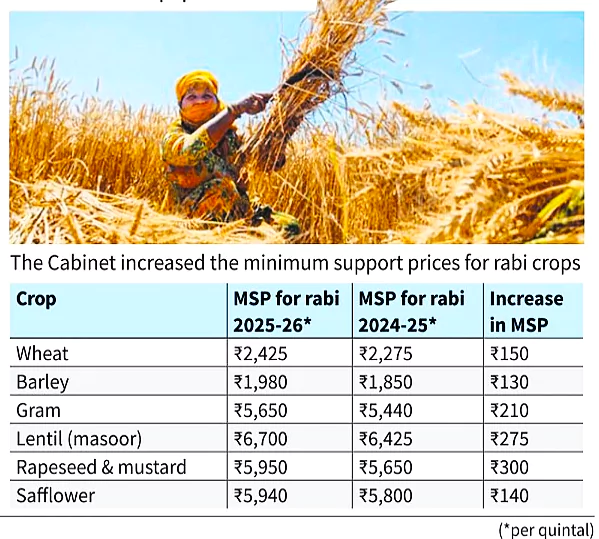The Centre increased the Minimum Support Price (MSP) for six rabi crops, with wheat’s MSP rising by ₹150 per quintal to ₹2,425.
MSP Hike Aligns with Budget Policy to Boost Farmer Income and Crop Diversification
- Alignment with Budget Policy: The increase follows the 2018-19 Union Budget policy to set MSP at 1.5 times the all-India weighted average cost of production.
- Impact: The revised MSP aims to incentivize crop diversification and ensure better returns for farmers.
Minimum Support Price (MSP) for six rabi crops

What is the Minimum Support Price?
- MSP is the guaranteed price paid to farmers when the government purchases their produce.
- It is based on recommendations by the Commission for Agricultural Costs and Prices (CACP), which evaluates factors such as production cost, demand-supply dynamics, market trends, and price parity between crops.
- CACP, an attached office of the Ministry of Agriculture and Farmers Welfare, was established in January 1965.
- The Cabinet Committee on Economic Affairs (CCEA), chaired by the Prime Minister, takes the final decision on the level of MSPs.
Enroll now for UPSC Online Course
Objective of MSP
- MSP aims to ensure remunerative prices for farmers’ produce and promote crop diversification.
- CACP recommends MSP for 22 mandated crops.
- Kharif Crops (14): Paddy, Bajra, Jowar, Maize, Arhar (Pigeon Pea), Ragi, Moong (Green Gram), Groundnut-in-shell, Urad (Black Gram), Soyabean, Niger seed, Sunflower, Sesamum, Cotton.
- Rabi Crops (6): Barley, Wheat, Gram, Rapeseed/Mustard seed, Masur (Lentil), Jute.
- Other Commercial Crops (2): Copra, Safflower.
- Fair and Remunerative Price (FRP) for sugarcane is determined by the Department of Food & Public Distribution.
- The MSP for Toria is determined based on the MSP of Rapeseed/Mustard seed, and the MSP for De-Husked coconut is based on the MSP of Copra.
Types of Production Costs Considered by CACP
- A2 Cost: Includes all paid-out costs such as seeds, fertilisers, pesticides, hired labour, fuel, etc.
- A2+FL Cost: Adds the imputed value of unpaid family labour to A2.
- C2 Cost: A more comprehensive cost that includes A2+FL, along with interest and rentals for owned land and fixed capital.
- A2+FL is used to calculate returns, while C2 serves as a benchmark to ensure MSPs at least cover production costs in major producing states.
Other Factors considered by CACP
- Market Prices: Prevailing market prices of the crop play a role in setting the MSP. The MSP is often set slightly above the market price to provide a buffer against price fluctuations.
- Demand and Supply: The demand and supply situation for a particular crop in the market influences its MSP. Crops with higher demand and limited supply might have a relatively higher MSP.
- Cost of Living Index: The cost of living index, representing changes in the cost of basic necessities, affects the MSP calculation as it relates to the well-being of farmers.
- Global Prices: For crops that are traded internationally, global prices can influence the domestic MSP. Government aims to ensure that domestic prices remain competitive in the global market.
- Inflation: Inflation rates impact input costs and production expenses. Higher inflation can lead to higher recommended MSPs to maintain farmers’ real income levels.
- Technology and Productivity: Technological advancements and improvements in productivity can impact production costs, influencing the MSP.
- Crop Cycle: The cropping cycle, including the duration and timing of sowing and harvesting, affects the MSP. Longer-duration crops might have different cost structures.
- Risk Premium: CACP might include a risk premium to compensate farmers for uncertainties and risks associated with agriculture, such as weather fluctuations and market volatility.
- Government Policies: Government policies related to agriculture, trade, and procurement can influence the MSP. Policies that aim to encourage or discourage cultivation of certain crops can impact their MSPs.
Check Out UPSC Modules From PW Store
| Rabi Crops for which MSP has been announced
Wheat:
Rapeseed & Mustard: ₹5,950 per quintal (₹300 increase)
Lentil (Masur): ₹6,700 per quintal (₹275 increase)
Gram: ₹5,650 per quintal
Safflower: ₹5,940 per quintal (₹140 increase)
Barley: ₹1,980 per quintal (₹130 increase) |
- Farmers’ Welfare: Ensuring that the MSP provides reasonable returns to farmers and supports their livelihoods is a primary consideration in setting the MSP.
![]() 17 Oct 2024
17 Oct 2024
